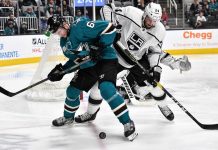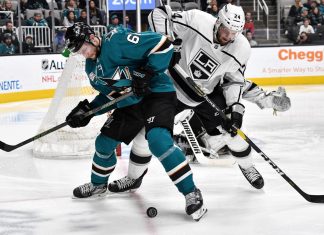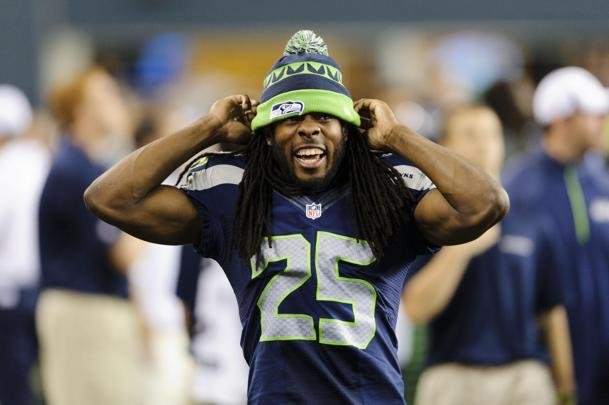Wes McCauley keeps his good calls close and his bad calls closer.
Any time the veteran NHL referee is feeling too good or gets down on himself, he breaks out a binder full of his missed calls and looks through it.
”It’s a humbling book,” McCauley said. ”Trust me, I’ve made a lot of mistakes. There’s times you wish you could saw your arm off.”
McCauley’s arms have signaled countless penalties, goals and no-goals since his NHL career began in 2003. Over the past 15 years, he has developed a reputation as not only the most animated referee in the game but the best in hockey based on his consistency, rapport with players and coaches and a demeanor that’s equal parts entertaining and professional.
In an NHLPA poll last spring, almost half of players chose McCauley as the league’s best referee, honoring a man in stripes who’s far more used to getting barked at than complimented.
”I don’t think I’m that good,” McCauley told The Associated Press. ”My job’s just to officiate hockey games and to do the best I can and to move on to the next game and really to stay out of the highlights.”
McCauley has his own highlight reels because he enjoys hamming it up when he makes announcements. When he reaches to his right hip to turn on the microphone, it’s must-see entertainment.
His flair for the dramatic once sent former Rangers coach Alain Vigneault into a laughing fit on the bench, and it has been the subject of mocking from veteran officials for just how demonstrative he can be when whistling a penalty or waving off a goal. McCauley knows he’s more exuberant than he has to be, but that’s part of the fun for him and players.
”He’s real,” Avalanche forward Nathan MacKinnon said. ”He’s obviously an animated guy and definitely calls a good game.”
McCauley earned the votes of 47.8 percent of players as the NHL’s best referee, well ahead of Kelly Sutherland (17.7 percent), Tim Peel (4.4 percent), Dan O’Halloran (2.7 percent) and Trevor Hanson (2.7 percent). The 46-year-old from Georgetown, Ontario, is the most popular and respected ref because he gets it right more often than not, apologizes when he doesn’t and knows how to explain his calls to players and coaches.
”Consistency. You kind of know what you’re getting with him,” Rangers forward Chris Kreider said. ”In any sport when you talk about refereeing, if a ref isn’t very visible and prevalent and the game is decided by the players ultimately, then that’s a good ref and that’s Wes.”
McCauley gets that. He played four seasons at Michigan State from 1989-93, had a cup of coffee in the minors and figures his relationships with players from that era bought him the benefit of the doubt, and some of that still exists.
”He’s in charge out there, and there’s really not a lot of gray area,” said Capitals coach Todd Reirden, who went to Bowling Green and played against McCauley in college. ”He stands his line and he lets the players play, but he also has a great pulse of what’s going on and I think that’s from his experiences of playing the game at a collegiate level and also some at a pro level. He relates really well with the players and with the coaches.”
McCauley vividly remembers botching a call in Game 3 of the Stanley Cup Final when he didn’t see that Washington’s Chandler Stephenson, not Vegas defenseman Deryk Engelland, tripped teammate Nicklas Backstrom and called a penalty. As with many other calls, he hoped it wouldn’t directly affect the result and apologized to Engelland later.
That’s a common theme during McCauley’s career.
”I still remember one time he made a bad call and he found me the next time we were playing and said: `Hey, I just want to let you know I know that call was really bad. I’ve been thinking about it a lot and I wanted to apologize,”’ Winnipeg center Mark Scheifele said. ”When he has the respect level for the game and for us as players, we have respect for him. And I think that’s why he’s known to be the best referee out there.”
Best referee out there? ”Now you jinxed me – now I’m going to be up and down like a toilet seat next season,” McCauley quipped. Maybe earlier in his career that was a danger, though McCauley now has 957 regular-season and 131 playoff games under his and has worked six Stanley Cup Final series.
Over that time, McCauley has developed a balance between knowing players see him as an obstacle to winning while still communicating with them to the point they know him personally. Even if players aren’t happy with his calls, they appreciate McCauley’s honesty and ability to have just as big a mouth as they do.
”You automatically sometimes snap at the refs,” Stars center Tyler Seguin said. ”Sometimes you blame the refs for things that were even out of their control. And he finds a way to take it, give it back a little and then move on pretty quickly and he’s always been very respectful to the players and I think that’s what makes him a great ref.”
McCauley’s life experiences helped make him a great ref. His dad, John McCauley, worked 15 years as an NHL referee before an eye injury took him off the ice and led to a director of officiating job before his unexpected death at age 44. His brother, Blaine, suffered an eye injury that cost him his hockey-playing career and changed Wes’ view forever.
”My biggest thing is when I step on the ice, I want the players to feel like, `Oh, OK we’re going to get a fair shake tonight,”’ McCauley said. ”I’ve never really taken it for granted, so I try to go out there and referee every game the best I can.”
—
Follow AP Hockey Writer Stephen Whyno on Twitter at https://twitter.com/SWhyno
—
More AP NHL: https://apnews.com/tag/NHL and https://twitter.com/AP-Sports
25% Bonus via Western Union























